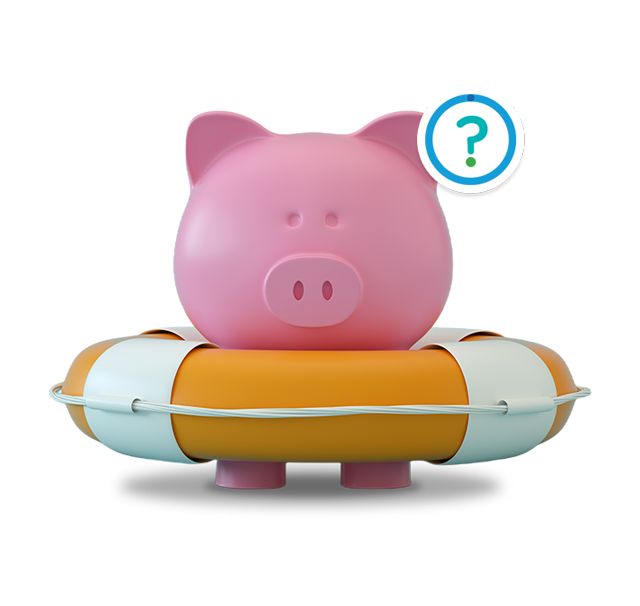
Early access to superannuation: Understanding your options
Your super is all about setting money aside for when you retire. It's a nest egg of funds that hopefully should grow over your working life and support you for later on.
Usually, you can't touch this money until you retire. However, sometimes things don't go to plan, and you might need to access some of your super sooner. There are specific scenarios and rules around when you may get early access to your super – typically when you are facing severe financial hardship or on compassionate grounds.
Let’s explore some choices for accessing super early if you ever find yourself or a loved one in a tough spot.

Can you apply for early release of super due to severe financial hardship?
Your super is meant to help your retirement, so there are strict rules around accessing it early due to severe financial hardship. These rules are specified by law and must be followed by Australian super funds.
Answer a few questions to see if you may be eligible.
Ok, here's the first question.
Have you withdrawn superannuation due to severe financial hardship in the last 12 months?
Are you currently receiving Commonwealth income support payments? eg. Centrelink or Social Security
I've already applied for severe financial hardship with Rest
Once we have receive your application:
- We’ll review it and make a payment to your bank within 5 business days.
- If we have your mobile number, we’ll text you to confirm we’ve made the payment.
- Your bank may take another 2-3 days to allocate the money to your account.
We’ll reach out to you if we need more information. Once we’ve received all the necessary details, we'll make a payment to your bank within 5 business days.
Are you under 60 years and 39 weeks of age?
Have you reached 60, plus 39 weeks and have been receiving Commonwealth income support payments for a cumulative period of 39 weeks since reaching age 60?
Have you been receiving Commonwealth income support payments for a period of 26 continuous week?
Are you unemployed or employed less than 10 hours a week?
Are you unable to meet reasonable and immediate family living expenses?
Based on your responses, you may be eligible to access your super early due severe financial hardship.
The next step is speak to a Customer Service Consultant, Monday to Friday 8am-8pm or Saturdays 9am-5pm (AEST/AEDT), who will need your Centrelink Reference Number (CRN) to confirm your eligibility. After confirming your eligibility, they will then take you through the application process and send you a form.
Based on your responses, you're not eligible to access your super early due severe financial hardship.
We understand this must feel disappointing. As an Australian super fund, we need to follow the eligibility criteria prescribed by law. There are other limited circumstances where you might be able to access your super early, which you can read here.
Severe financial hardship and your super
Severe financial hardship is when you are unable to meet reasonable and immediate family living expenses like groceries, rent or medical costs. You may be able to access some of your super early to help.
WATCH: Financial hardship and accessing your super early at Rest
Am I eligible for early super access under severe financial hardship?
To apply for early release of super due to severe financial hardship you must meet the following criteria:
- you’ve been receiving Commonwealth income support payments for 26 continuous weeks and
- you’re unable to meet reasonable and immediate family and living expenses
Or
- you're aged over 60 and 39 weeks and
- you’ve been receiving Commonwealth income support payments for a cumulative period of 39 weeks since reaching 60 and
- you’re not gainfully employed when you apply (that is, you’re unemployed or employed less than 10 hours a week)
Note: These criteria are set out in law and must be followed by Australian super funds
If you’re unsure how long you’ve been receiving Commonwealth income support payments (e.g. Centrelink or Social Security), you can view your payment summary on the myGov portal.
- The minimum amount you can withdraw is $1,000 and the maximum is $10,000. If your super balance is less than $1,000 you can withdraw up to your remaining balance after tax.
- Withdrawals under Severe Financial Hardship are generally taxed at a rate of 22% of the taxable component if you are under 60.
How do I apply to access my super early due to severe financial hardship?
Have your Centrelink Customer Reference Number (CRN) handy when you contact us so that we can confirm you meet the eligibility criteria.
- Once confirmed, we’ll send you a form (via email or post) to complete.
- When we receive your completed form, we’ll make your payment to your bank account within 5 business days – you’ll also need to allow another 2-3 days for your bank to process the payment.
Compassionate grounds: When can you withdraw super early?
You may be able to withdraw some of your super early on compassionate grounds if you need to pay for:
- medical costs – for treatment or travel to treatment for you, your partner, child or other dependant
- mortgage – to stop the bank from selling your home
- disability – to modify your home or car to accommodate the special needs of you or your dependant which arise from a severe disability
- palliative care – for you or a dependant
- funeral – to pay for expenses for a dependant.
Am I eligible for early super access on compassionate grounds?
Visit the Australian Taxation Office (ATO) website here for eligibility criteria for applying to access some of your super on compassionate grounds.
How to apply for early access on compassionate grounds
You’ll need to apply for access to your super on compassionate grounds directly with the ATO.
Apply online via the ATO page in myGov - go to ‘compassionate release’ in the super tab. Your application can take up to 14 days (28 days for paper applications) – Rest can’t provide a progress update while the ATO is assessing your claim.
Once your claim has been assessed the ATO will notify you of the outcome via phone or SMS, and you’ll receive a message in your myGov inbox (or post if you applied with a paper form).
If your claim is approved, you’ll receive an approval letter from the ATO. You can then complete an online withdrawal form within MemberAccess:
- Log in to MemberAccess
- Click on Your Account in the top menu then on Benefit quote
- Click on ‘complete this online form’ to begin
Additional circumstances for early super access
There are additional circumstances where you may be able to access super funds early outside of severe financial hardship or compassionate reasons.
Permanent incapacity or terminal illness
In general, you can access your super early if you’re:
- Permanently incapacitated – unlikely to engage in gainful employment for which you’re reasonably qualified (by education, training or experience) because of physical or mental ill health. You may also be eligible to access your super if you meet the criteria but are engaging in light duties in a different position or casual work in a different field. Learn more here.
- Diagnosed with a terminal illness – Rest will require proof of your condition from two separate medical practitioners that you suffer from an illness or injury that is likely to result in your death within 24 months of the date of the certification. In the case of terminal illness, one of the practitoners must be a specialist in the particular field related to the illness or injury suffered by you. Please note the 24 month certification period from the date of the certifications has not ended.
If you have Death or Total Permanent Disability (TPD) insurance as part of your Rest account, you may be able to make a claim. Learn more here.
Departing Australian Superannuation Payment (DASP)
If you came to Australia on an eligible temporary resident visa (excluding subclasses 405 and 410), worked here, and earned super in that time, you may be able to take some of these funds with you. You may only apply for DASP after you have left Australia, and your visa has expired. Strict eligibility criteria and some temporary visa exclusions may apply. Learn more about the DASP here.
First Home Super Saver Scheme (FHSSS)
To assist in purchasing your first home, you may be eligible to withdraw some voluntary super contributions. The scheme may assist would-be homebuyers bolster their deposit savings and may potentially offer tax benefits. However, strict eligibility, rules, withdrawal limits and timeframes apply. Learn more about the First Home Super Saver Scheme here.
Other circumstances for early super access
Other conditions in which you can apply to access super early may include:
- low super balance – if your super balance is under $200 and you've left your employment, or if you have found a 'lost super' account with less than $200. For Rest members, to withdraw this money, you’ll need to log in to MemberAccess and select ‘Your Account’, then ‘Benefit quote’, and complete the online benefit payment form.
- ‘Unrestricted non-preserved’ classified super – if you have ‘unrestricted non-preserved’ super (for example, benefits for which you previously met a condition of release and kept the money in your super fund). To find out whether you have this, check your most recent annual statement or Rest members can log in to MemberAccess and select ‘Your Account’, then ‘Benefit quote’. To withdraw this money, you’ll need to complete the online benefit payment form within the same section of MemberAccess.
- New Zealand citizen (may transfer funds to a KiwiSaver scheme)
For more information on these and other conditions, please read our factsheet on accessing your super early.
Managing cost of living expenses
Cost of living pressures can put serious financial strain on Australian households, and it’s hard to keep track of what to pay first when everything seems urgent. Luckily, there are resources and strategies available to help you potentially manage your living expenses. Read more here.
While early access to super can provide much-needed relief in times of hardship, it's not a decision to be taken lightly. Keep in mind that there may be government resources and support available, as well as hardship programs through your bank or financial provider, to help you navigate tough times. It’s worthwhile weighing up your options against your specific financial needs now (and in the future) before you proceed.
If you are concerned that early access to super may impact your retirement, please speak to your super fund. If you’re a Rest member, speak with a Rest Adviser. For simple superannuation phone advice, there is usually no extra charge to you – it’s part of being a member of Rest.
You may be eligible to access some or all your super today if you’ve already reached aged 60. For more information, visit our Accessing Your Super page.
Want to learn more?


Unexpected events
Understanding what you can do if you’re facing financial hardship
If you're facing financial hardship, there's options you can consider to help make ends meet.


Member News
In tough times, every little bit helps
Struggling with the cost of living? Taking a few steps now may help you save a few dollars.
